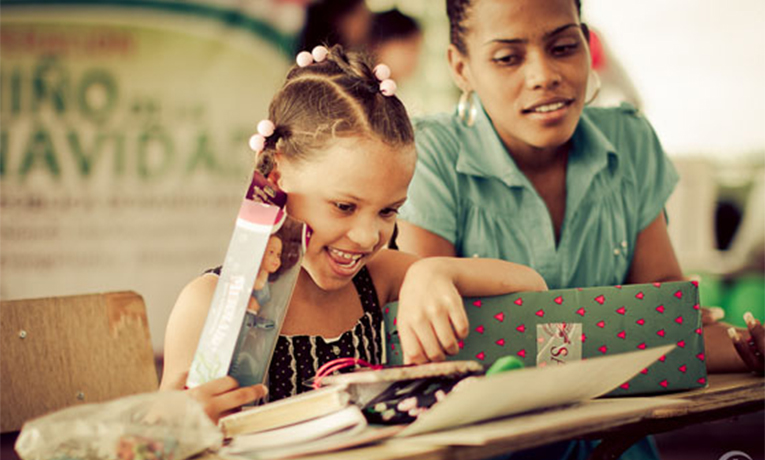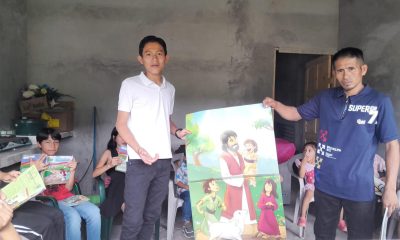By Kim Rowland, Community Relations Coordinator for Operation Christmas Child
Humility. It’s a subject that has been on my mind since I traveled to Panama to document stories from volunteer Operation Christmas Child leaders from more than 20 Latin American countries. I left the conference in awe of their humility, but even more in awe of how God uses that humility to bless Operation Christmas Child beyond what we can imagine each year.
I’m going to venture out on a limb and suggest that humility does not come naturally to the vast majority of the human race. We tend to be self-serving, to want recognition for our accomplishments, to be noticed in our world. Ever since man sinned in the Garden of Eden, we have struggled with God’s exhortations to be humble.
What is humility and how do we practice it? On the Sunday after I returned home, a pastor at my church taught about humility by defining the original Hebrew word for humble as used in Exodus 10:3. So Moses and Aaron went to Pharaoh and said to him, “This is what the Lord, the God of the Hebrews, says: ‘How long will you refuse to humble yourself before me?’” (NIV)
The Hebrew word “anah” means “be humbled.” But in Hebrew, words are associated with specific physical imagery that is often a better definition of the word. The pastor said this particular word is associated with being bent over, bowing down, becoming low. Even more specifically, it means tilling the soil or taking care of the ground.
Humility is looking down to the dirt, and taking care of it, helping turn it into a source of life where things flourish and grow. Humility is doing the work, and giving God the credit when the work flourishes.
I feel incredibly blessed to be on staff at Samaritan’s Purse, working with the Operation Christmas Child community relations team. Each year, we collect millions of shoe boxes filled with simple gifts, and deliver them to children across the globe. And each year, the work of the relatively small staff is supplemented by hundreds of thousands of volunteers worldwide, many of whom—in the midst of their regular, full-time jobs—work year-round to help collect and distribute the boxes.
In early May, about 80 volunteers from more than 20 countries in the Americas and Caribbean gathered in Panama for training, fellowship, and spiritual renewal. I attended the conference to gather stories about children who receive shoe box gifts and participate in The Greatest Journey discipleship program. I left with just a fraction of the millions of stories that could be told. But more importantly, I left with a renewed sense of wonder and reinforced belief that this project belongs entirely to God.
In Honduras, a remote community that received shoe box gifts gave a parcel of land to the church that distributed the gifts, asking them to build a church there.
In the Bahamas, a boy prayed for a black shirt and black hat for Christmas. His mother could not afford the gifts, but two months later he received those exact items in a shoe box.
In Costa Rica, five children who lived and worked in a landfill have been sponsored and are now able to go school—all through a shoe box gift and Biblical discipleship lessons.
In Uruguay, four children arrived at a shoe box distribution without any shoes, and each of the gifts they received contained a pair of shoes. The father and many people in the neighborhood accepted Christ when they saw the power of these simple gifts.
In Argentina, churches that never before worked together are now united in partnership because of the gifts.
In the Dominican Republic, 7-12 churches are planted each year after shoe box gift distributions are held in different communities.
In Venezuela, a girl who received a winter hat, gloves and a scarf in her box exclaimed, “How did God know I would need these? I am moving to the mountains where it snows!”
There are countless more stories, but just one is enough to reassure me that this is God’s project. Each of the volunteer leaders was quick to emphasize that it was God, not them, who was responsible for the incredible transformations they are seeing in their countries.
“It’s something that comes from God’s heart,” said Silvana Piccirillo, a volunteer in Uruguay.
Through Operation Christmas Child and The Greatest Journey, God allows us—the staff, volunteers, and everyone who packs a shoe box—to be Jesus’ hands and feet and demonstrate His love to people around the world. I know beyond a shadow of a doubt that God will use this project to work in the lives of children, families, and entire communities around the world.
Staff and volunteers alike may feel at times that collecting 6.5 million gifts in the United States and 9.1 million gifts worldwide is a daunting task. We may feel intimidated when we think about delivering the gifts to communities so remote that they never receive outside visitors—like the one in Honduras where cartons of shoe boxes must be carried on shoulders during a four-hour hike through the mountains because the trail is inaccessible even by 4WD.
But we can rest assured, because we know one thing for sure. God can do this, and more. We will do the work to the best of our abilities. And we humbly will give God the credit when these miracles are accomplished.







